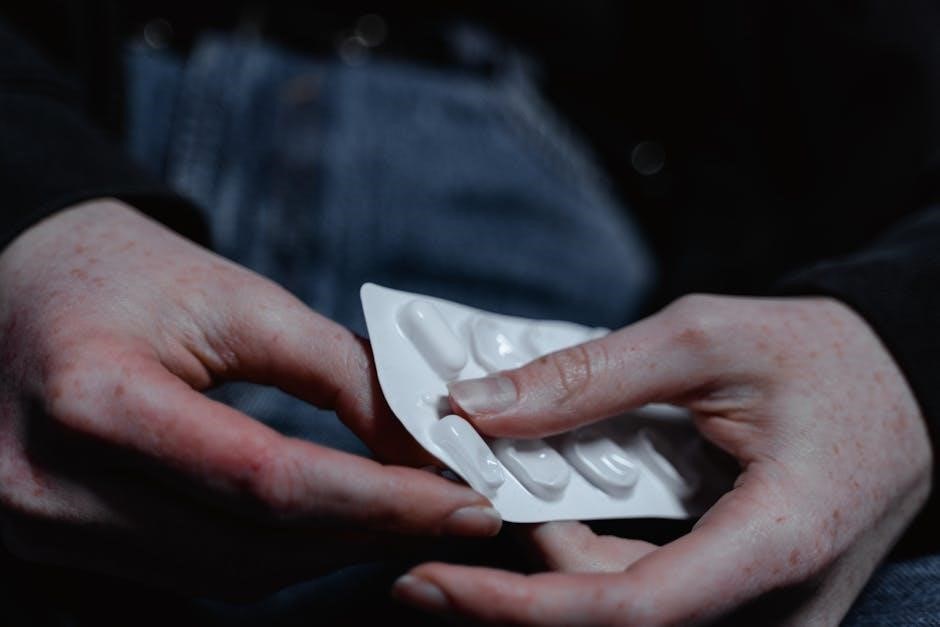Infidelity counseling and marriage therapy provide a safe space for couples to address emotional turmoil‚ understand betrayal‚ and navigate the complex process of healing and rebuilding trust.
Understanding the Emotional and Psychological Impact
Infidelity often triggers intense emotional turmoil‚ including feelings of betrayal‚ mistrust‚ and profound sadness. The psychological impact can vary widely‚ with some individuals experiencing shock‚ anger‚ or even identity crises. Partners may struggle with anxiety‚ depression‚ or a loss of self-worth‚ while others might feel numb or detached. The depth of these emotions often correlates with the severity of the betrayal and the individual’s attachment style. Healing requires acknowledging these feelings and addressing the underlying issues that led to the infidelity. Professional guidance‚ such as counseling‚ can help individuals and couples process their emotions and work toward recovery. The emotional and psychological impact of infidelity is unique to each person‚ making it essential to approach healing with patience and empathy.

The Role of Counseling and Therapy
Counseling and therapy play a crucial role in addressing infidelity by providing a structured and supportive environment for individuals and couples to navigate the aftermath. Licensed professionals guide the process of understanding the underlying causes of the betrayal‚ fostering open communication‚ and helping partners express their emotions. Therapy is not solely focused on saving the relationship but also on individual healing and growth. It equips individuals with tools to rebuild trust‚ process grief‚ and develop healthier relationship dynamics. For couples‚ therapy can facilitate mutual understanding and accountability‚ while for individuals‚ it offers a space to explore personal resilience and recovery. The expertise of a therapist is essential in managing the complex emotional landscape and creating a pathway toward healing and potential reconciliation.

Treatment Plan Components
A comprehensive treatment plan for infidelity addresses emotional healing‚ transparency‚ and rebuilding trust. It includes assessment‚ communication strategies‚ and coping techniques to foster accountability and intimacy.
4.1 Assessment and Evaluation
The initial phase of infidelity treatment involves a thorough assessment to identify the root causes of the betrayal and evaluate its impact on both partners. This step is crucial for understanding the emotional and psychological dynamics at play. Through open discussions and structured exercises‚ therapists help couples uncover underlying issues such as communication gaps‚ intimacy challenges‚ or unresolved conflicts. The assessment also considers the severity of the infidelity‚ including the duration of the affair and the level of deceit involved. By gaining clarity on these factors‚ a personalized treatment plan can be developed to address specific needs and promote healing. This foundational step sets the stage for rebuilding trust and fostering a healthier relationship.
4.2 Coping Strategies and Emotional Healing
Coping with infidelity requires tailored strategies to manage emotional pain and foster healing. Techniques such as mindfulness‚ journaling‚ and emotional labeling help individuals process their feelings constructively. Support networks‚ including friends‚ family‚ or support groups‚ can provide additional comfort and understanding. Self-care activities‚ like exercise or meditation‚ are encouraged to reduce stress and promote emotional resilience. Couples may benefit from guided exercises that encourage honesty and empathy‚ helping them reconnect on a deeper level. Professional therapists often incorporate evidence-based methods to address trauma and rebuild emotional safety. The focus is on creating a space where both partners can express their emotions and work collaboratively toward healing. These strategies aim to alleviate suffering and lay the groundwork for a more stable and affectionate relationship.
4.3 Effective Communication Techniques
Effective communication is crucial for healing after infidelity. Couples should practice active listening‚ expressing emotions without blame‚ and using “I” statements to avoid defensiveness. Setting boundaries and creating a safe space for open dialogue helps rebuild trust. Techniques like empathy and validation foster understanding‚ while structured exercises‚ such as timed conversations or reflective listening‚ can enhance clarity. Therapists often recommend tools like emotional labeling and problem-solving frameworks to address conflicts constructively. Honest and consistent communication helps both partners feel heard and valued‚ laying the foundation for reconciliation; These strategies encourage transparency‚ accountability‚ and mutual respect‚ which are essential for moving forward together.
4.4 Promoting Accountability and Transparency
Promoting accountability and transparency is vital in addressing infidelity. The unfaithful partner must acknowledge their actions and take responsibility‚ while the injured partner deserves honesty about the betrayal. Open communication fosters trust‚ with both partners committing to transparency in their interactions. Regular check-ins and agreed-upon boundaries help prevent future deceit. Accountability involves consistent follow-through on commitments‚ demonstrating reliability and dedication to healing. Transparency ensures both partners feel informed and secure‚ creating a foundation for rebuilding trust. These practices help couples move past betrayal and work toward a healthier‚ more honest relationship.
4.5 Rebuilding Trust and Intimacy
Rebuilding trust and intimacy after infidelity requires consistent effort‚ vulnerability‚ and empathy. Couples must create a safe environment where open communication and emotional expression are encouraged. Small‚ meaningful gestures and reliable actions over time help restore trust. Intimacy is rebuilt through emotional connection and shared experiences‚ fostering a deeper bond. Professional guidance can help navigate this delicate process‚ ensuring both partners feel heard and valued. Patience and commitment are essential‚ as healing takes time. By prioritizing transparency and mutual understanding‚ couples can gradually reestablish trust and intimacy‚ laying the groundwork for a stronger‚ more resilient relationship.

Recovery and Moving Forward
Recovery from infidelity is a gradual process that requires patience‚ understanding‚ and commitment from both partners. It involves acknowledging the pain caused by the betrayal and working together to create a stronger‚ more resilient relationship. Professional guidance‚ such as couples therapy‚ can help navigate the emotional challenges and develop healthier communication patterns. Support networks‚ including friends‚ family‚ or support groups‚ can also play a crucial role in the healing journey. Moving forward doesn’t mean forgetting the past but rather learning from it to build a future grounded in trust‚ empathy‚ and mutual respect. Both partners must be willing to grow and evolve together‚ fostering a deeper understanding of each other’s needs and desires. Recovery is not linear‚ but with consistent effort‚ couples can move beyond the betrayal and create a more fulfilling partnership.
Addressing Financial Infidelity
Financial infidelity‚ such as hiding debts or maintaining secret accounts‚ can deeply erode trust in a relationship. Addressing this issue requires transparency and open communication about financial matters. Couples should work together to create a shared understanding of their financial situation and establish joint goals for managing money. This may involve setting boundaries‚ such as requiring mutual approval for significant purchases or investments. Professional counseling can help partners navigate the emotional and practical challenges of financial infidelity‚ fostering accountability and collaboration. Rebuilding trust in this area involves consistent honesty and a willingness to address past financial deceit. By creating a more transparent and equitable financial dynamic‚ couples can strengthen their relationship and reduce future risks of financial betrayal.
The Importance of Vulnerability
Vulnerability is a cornerstone of healing in relationships affected by infidelity. It involves openly sharing emotions‚ fears‚ and experiences‚ creating a foundation for trust and intimacy. Both partners must engage in vulnerable conversations to address the betrayal and its impact. A therapist can facilitate this process by creating a safe space for honest dialogue. Vulnerability helps partners confront unresolved issues and work toward mutual understanding. By expressing deeper thoughts and feelings‚ couples can begin to rebuild their connection. This openness fosters accountability and empathy‚ essential for moving past infidelity. Over time‚ vulnerability strengthens the relationship‚ allowing both individuals to grow and heal together.
Couples Therapy Exercises
Couples therapy exercises play a crucial role in healing after infidelity. These exercises are designed to rebuild trust‚ improve communication‚ and address underlying issues. Common exercises include identifying emotional triggers‚ practicing empathy‚ and engaging in open dialogue about the infidelity. One effective exercise is “structured conversations‚” where couples discuss specific topics under a therapist’s guidance‚ fostering honesty and understanding. Another exercise involves creating a shared vision for the future‚ helping partners align their goals and commitments. These activities promote accountability‚ intimacy‚ and mutual growth‚ enabling couples to navigate the healing process together. By actively participating in these exercises‚ couples can work toward rebuilding their relationship and strengthening their bond.
Individual vs. Joint Therapy
When addressing infidelity‚ therapy can be conducted individually or jointly‚ depending on the couple’s needs and readiness. Individual therapy allows each partner to process their emotions separately‚ ensuring personal growth and self-awareness. It provides a safe space for each individual to explore their feelings without feeling overwhelmed or judged. Joint therapy‚ on the other hand‚ focuses on rebuilding the relationship by fostering communication and understanding between partners. A therapist can guide both individuals to address conflicts‚ rebuild trust‚ and work through the aftermath of infidelity together. The choice between individual and joint therapy often depends on the severity of the betrayal‚ the readiness of each partner to engage in the process‚ and the therapist’s assessment of the most effective approach. Both formats are valuable and may be used in conjunction with one another for comprehensive healing.
Support Networks and External Resources
Building a strong support network is crucial for individuals and couples recovering from infidelity. Licensed mental health providers specializing in affair recovery can offer personalized guidance and therapy. Additionally‚ support groups‚ either in-person or online‚ provide a space to share experiences and connect with others facing similar challenges. External resources such as books‚ articles‚ and workshops on infidelity recovery can also offer valuable insights and strategies. It’s important to leverage these resources to enhance the healing process. A combination of professional help and a supportive community can create a comprehensive system to aid in recovery and rebuilding trust. These networks play a vital role in helping individuals and couples navigate the emotional and relational complexities of infidelity.

Rebuilding the Relationship
Rebuilding a relationship after infidelity requires commitment‚ effort‚ and patience from both partners. Open communication and vulnerability are essential to restore trust and intimacy. Couples must address the root causes of the infidelity and work together to create a renewed connection. Professional guidance from a therapist can help navigate this process‚ ensuring both partners feel heard and validated. Rebuilding trust involves consistent transparency and accountability‚ while fostering emotional intimacy through shared activities and meaningful conversations. Small gestures of kindness and empathy can help heal emotional wounds. Ultimately‚ rebuilding the relationship is a journey that requires dedication‚ understanding‚ and a willingness to grow together. With time and effort‚ couples can create a stronger‚ more resilient partnership.
Recovering from infidelity is a challenging yet potentially transformative journey for couples. A well-structured treatment plan‚ guided by professional therapy‚ can help partners navigate the emotional turmoil and rebuild their relationship. Key elements include open communication‚ accountability‚ and a commitment to healing. While the process is not easy‚ many couples emerge stronger and more connected. Ultimately‚ the decision to rebuild or part ways should be made with clarity and mutual respect. Professional support‚ coupled with dedication‚ can lead to a more resilient and meaningful partnership. Healing from infidelity requires time‚ effort‚ and vulnerability but offers the opportunity for growth and renewal.



